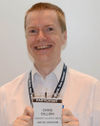Chris Dillon: Difference between revisions
No edit summary |
Chrisdillon (talk | contribs) General update. |
||
| (19 intermediate revisions by 4 users not shown) | |||
| Line 3: | Line 3: | ||
|caricature = ChrisDillionCaricature.jpg | |caricature = ChrisDillionCaricature.jpg | ||
|country = UK | |country = UK | ||
|email = | |email = chris.dillon [at] bl.uk | ||
|website = | |website = | ||
|twitter = chris_j_dillon | |twitter = chris_j_dillon | ||
|facebook = | |facebook = | ||
|linkedin = [ | |linkedin = [https://uk.linkedin.com/in/chris-dillon Chris Dillon] | ||
|userbox = {{Template:UBX-CARD50}} | |||
}} | }} | ||
'''Chris Dillon''' is | '''Chris Dillon''' is a Collection Metadata Systems Analyst at the [http://www.bl.uk British Library]. | ||
He is a | He is a language/script expert, with a focus on Asian languages and an interest in [[IDN]]s.<ref>[[ICANN 41]] Interview</ref> | ||
He is a member of the [https://community.icann.org/display/croscomlgrprocedure/Chinese+Script+GP Chinese Generation Panel] and was chair of the [https://community.icann.org/display/croscomlgrprocedure/Latin+GP Latin Generation Panel] until 2016. For for further information about the panels, see [[Generation Panel]]. | |||
He was co-chair (with [[Rudi Vansnick]]) of the GNSO's [[Translation and Transliteration of Contact Information PDP WG]]. | |||
He was a volunteer on [[ICANN]]'s Variant Issues Project Chinese Case Study.<ref>[[ICANN 41]] Interview</ref> | |||
His main hobby is learning languages, the main ones being Chinese, French, German, Korean, Spanish and Swedish. | |||
He has previously served as Head of the Japanese Information Service at the British Library, Information Officer at the [https://dajf.org.uk/ Daiwa Foundation], and Systems Manager at [https://www.wycombeabbey.com/ Wycombe Abbey School].<ref>User Submitted</ref> | |||
==Publications== | ==Publications== | ||
Chris is the author of the Japanese grammar ''Japanese for Business'', published by Hugos in 1994. | Chris is the author of the Japanese grammar ''Japanese for Business'', published by Hugos in 1994. | ||
He set up Bridge to | He set up [https://sites.google.com/site/bridge2korea Bridge to Korea] open access resources for learning Korean in 2015. | ||
==Education== | ==Education== | ||
He has a degree in Japanese with Korean from the School of Oriental and African Studies, University of London. He | He has a degree in Japanese with Korean from the School of Oriental and African Studies, University of London. He studied for two and a half years at Tokyo University of Foreign Studies.<ref>[http://uk.linkedin.com/pub/chris-dillon/17/820/600 LinkedIn]</ref> | ||
== References == | == References == | ||
{{Reflist}} | {{Reflist}} | ||
[[Category: | [[Category:Academia]] | ||
Latest revision as of 21:20, 29 December 2023
 |
 | ||
| Country: | UK | ||
| Email: | chris.dillon [at] bl.uk | ||
| LinkedIn: | |||
| Twitter: | |||
| |||
Chris Dillon is a Collection Metadata Systems Analyst at the British Library.
He is a language/script expert, with a focus on Asian languages and an interest in IDNs.[1]
He is a member of the Chinese Generation Panel and was chair of the Latin Generation Panel until 2016. For for further information about the panels, see Generation Panel.
He was co-chair (with Rudi Vansnick) of the GNSO's Translation and Transliteration of Contact Information PDP WG.
He was a volunteer on ICANN's Variant Issues Project Chinese Case Study.[2]
His main hobby is learning languages, the main ones being Chinese, French, German, Korean, Spanish and Swedish.
He has previously served as Head of the Japanese Information Service at the British Library, Information Officer at the Daiwa Foundation, and Systems Manager at Wycombe Abbey School.[3]
Publications[edit | edit source]
Chris is the author of the Japanese grammar Japanese for Business, published by Hugos in 1994.
He set up Bridge to Korea open access resources for learning Korean in 2015.
Education[edit | edit source]
He has a degree in Japanese with Korean from the School of Oriental and African Studies, University of London. He studied for two and a half years at Tokyo University of Foreign Studies.[4]
